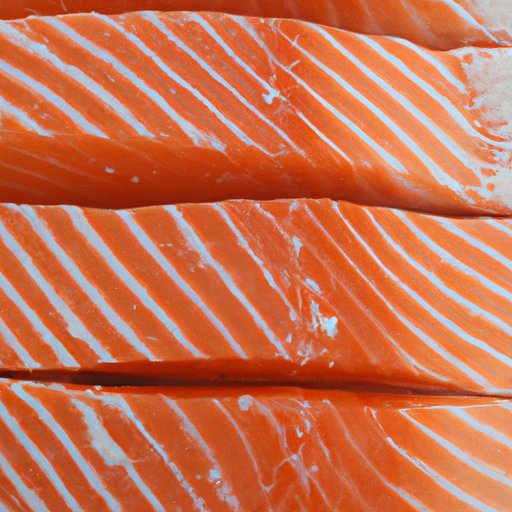
Introduction
There’s no denying that salmon is a delicious and healthy fish that’s packed with nutrients and compounds that our bodies need. However, it’s also important to recognize that overconsumption of salmon can have negative health effects. In this article, we’ll explore the optimal frequency of salmon consumption to strike a balance between reaping the health benefits and avoiding potential dangers.
The Health Benefits of Eating Salmon and the Recommended Frequency to Maximize Them
Salmon is rich in omega-3 fatty acids, protein, vitamin D, and other nutrients that can promote heart health, brain function, and decreased inflammation. Studies have shown that eating salmon at least twice a week can lead to a reduced risk of heart disease and stroke. However, individuals who are allergic to fish or concerned about the dangers of eating too much mercury should consult with a healthcare professional to determine the proper consumption frequency or alternatives.
Exploring the Dangers of Over-Consuming Salmon and Why Moderation is Key
While salmon has many health benefits, it’s also important to limit consumption to avoid overexposure to mercury, toxins, and pollutants. Overconsumption of salmon can result in negative health effects such as digestive problems, mercury poisoning, and high levels of cholesterol. Eating a diverse range of seafood and balancing salmon consumption with other forms of protein can help minimize risks.
A Guide to Portion Sizes and Frequencies in a Healthy Salmon-Based Diet
It’s recommended that individuals consume 3.5 to 4 ounces, or half a fillet of salmon per meal, two times a week to maximize its health benefits. Canned salmon and salmon burgers are easy alternatives to fresh salmon and can be found at most stores. However, individuals should be cautious of added sodium and preservatives in these products to avoid unhealthy imbalances in their metabolisms.
Comparing the Recommended Frequency of Salmon Consumption with Other Types of Fish and Seafood
While salmon is a delicious fish, it is not the only one that is recommended for optimal health. For instance, other types of fish and seafood such as sardines, mackerel, anchovies, and trout have comparable nutritional profiles and can be enjoyed to incorporate other sources of protein into the diet. Individuals should also consider avoiding or limiting consumption of fish and seafood that have high levels of mercury such as swordfish, shark, and tuna.
The Sustainability of Salmon Farming and the Impact of High Demand on the Environment
The high demand for salmon has led to the growth of salmon farming industries. However, these farms often have a negative environmental impact, affecting the natural habitat of wild salmon and leading to water pollution. Individuals should make efforts to buy sustainable salmon that has been farmed in closed systems with controlled breeding to prevent disease and overpopulation.
A Recipe Roundup for Delicious, Healthy Salmon Meals That Can Be Enjoyed in Moderation
Salmon is a versatile fish that can be cooked in many ways, including grilling, baking, poaching, and sautéing. Simple seasoning such as salt, pepper, herbs, and spices can be added to highlight the natural flavors of the fish. Here are some recipe ideas for healthy, delicious salmon meals:
- Salmon Salad with Avocado and Cilantro Dressing
- Grilled Salmon Skewers with a Lemon and Herb Marinade
- Salmon and Quinoa Bowl with Fresh Vegetables
- Poached Salmon with Lemon and Dill Sauce
- Baked Salmon with Pesto Sauce and Asparagus
- Sesame-Crusted Salmon with Soy Sauce and Ginger Glaze
- Skinless Salmon Burgers with Spicy Mayonnaise
Conclusion
Salmon is a healthy, delicious, and nutritious fish. However, it’s important to consume it in moderation and alongside other forms of protein to avoid risks associated with mercury buildup and other toxins. Individuals should also pay attention to the sustainability of salmon farming and minimize their impact on the environment. By doing so, they can maximize the health benefits that come with consuming salmon, while minimizing the risks.





